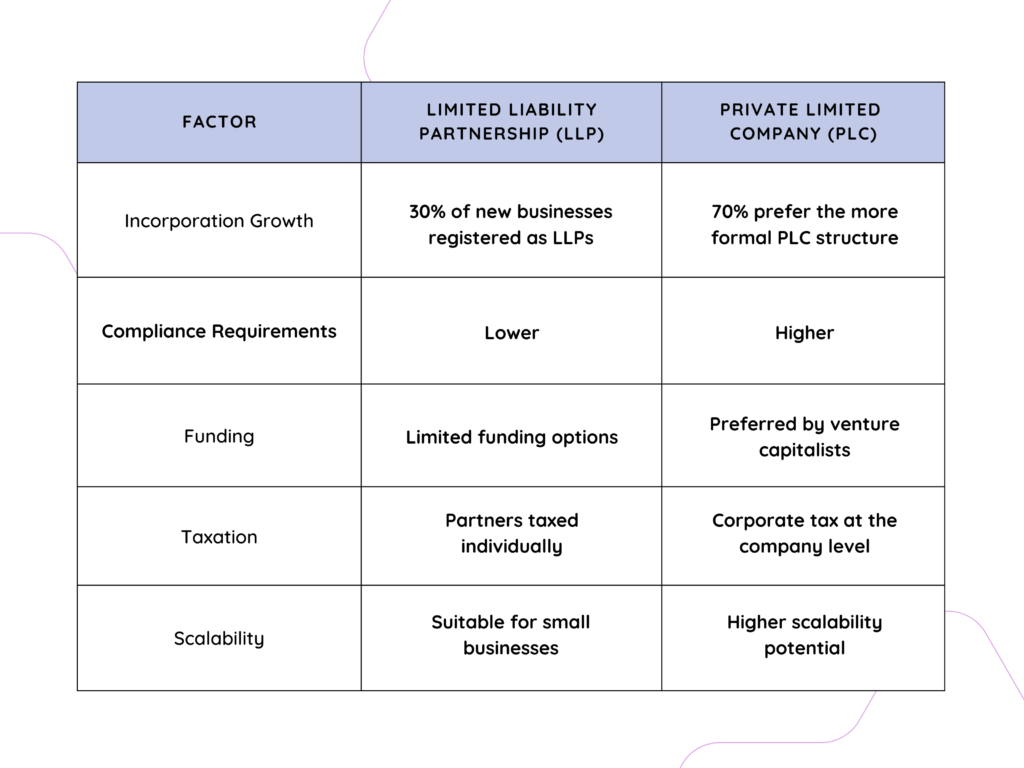🏗️ Introduction
One of the first — and most critical — decisions for any entrepreneur is choosing the right business structure. In India, two of the most popular options are:
- Private Limited Company (Pvt Ltd)
- Limited Liability Partnership (LLP)
While both offer limited liability and separate legal identity, they differ significantly in compliance, taxation, scalability, and investor appeal. This blog will walk you through a comprehensive comparison of Private Limited vs LLP — with real-world examples, pros and cons, and a CA’s checklist to help you choose the right structure for your business goals.
⚖️ Key Definitions
- Private Limited Company (Pvt Ltd)
A corporate entity registered under the Companies Act, 2013. It limits liability of members and allows equity-based ownership. - Limited Liability Partnership (LLP)
A hybrid structure combining features of partnerships and companies, governed by the LLP Act, 2008. Partners have limited liability, but management remains flexible.
📊 Quick Comparison Table
| Feature | Private Limited Company | LLP |
|---|---|---|
| Legal Entity | Separate legal entity | Separate legal entity |
| Ownership | Shareholders | Partners |
| Governing Act | Companies Act, 2013 | LLP Act, 2008 |
| Registration Authority | MCA (ROC) | MCA (ROC) |
| Minimum Members | 2 shareholders, 2 directors | 2 designated partners |
| Annual Compliance Cost | ₹25K–₹50K | ₹10K–₹20K |
| Fundraising (VCs/Angels) | Preferred structure | Less preferred |
| Tax Rate | ~22% (plus surcharge) | ~30% (for income > ₹1 Cr) |
| Audit Requirement | Mandatory | Only if turnover > ₹40 Lakhs |
| FDI Acceptance | Allowed under auto route | Restricted in some sectors |
🔍 Key Differences Explained
1. Ownership & Equity Flexibility
- Pvt Ltd allows issuing of shares, ESOPs, and varying ownership percentages.
- LLP has partners, not shareholders, with limited scope for equity dilution.
✅ Choose Pvt Ltd if you plan to raise external funding or offer stock options to employees.
2. Compliance & Regulatory Burden
- Pvt Ltd companies must file annual returns, hold board meetings, maintain minutes, and follow detailed secretarial practices.
- LLPs have lower compliance — no mandatory board meetings, simplified annual filings.
✅ Choose LLP if you want to keep compliance costs and obligations minimal.
3. Funding & Investment Readiness
- Venture Capitalists and Angel Investors prefer Pvt Ltd companies, as they allow equity ownership and easy exits.
- LLPs are rarely funded unless converted to Pvt Ltd later.
✅ Choose Pvt Ltd if you’re building a scalable startup or plan to seek investment.
4. Taxation
- Pvt Ltd companies pay 22% (base) corporate tax under the new regime (plus cess and surcharge).
- LLPs pay 30% tax on profits (plus cess and surcharge).
✅ Pvt Ltd offers a more tax-efficient structure in many cases, especially when profits are reinvested or distributed as salaries/dividends strategically.
5. Audit Requirements
- Pvt Ltd companies must be audited annually regardless of turnover.
- LLPs need audit only if turnover exceeds ₹40 lakhs or capital exceeds ₹25 lakhs.
✅ LLP is ideal for small businesses in early stages that want to avoid mandatory audits.
6. Scalability & Expansion
- Pvt Ltd companies are easier to scale, open international subsidiaries, receive FDI, and launch IPOs.
- LLPs are generally best suited for professionals or service businesses (law firms, agencies, etc.).
✅ Choose Pvt Ltd if you plan to expand nationally or globally in the future.
📈 Real-World Examples
- LLP Use Case:
Two freelance developers start a software consulting agency. They opt for an LLP to enjoy limited liability and minimal compliance. - Pvt Ltd Use Case:
A tech startup building a SaaS product plans to raise seed funding. They register as a Pvt Ltd company to offer shares to investors and attract talent using ESOPs.
📋 A CA’s Checklist to Help You Choose
| Question | Recommendation |
|---|---|
| Will you raise external funding? | ✅ Choose Pvt Ltd |
| Are you starting with just 2–3 partners? | ✅ Choose LLP |
| Will you need to issue ESOPs or shares? | ✅ Choose Pvt Ltd |
| Do you want minimal yearly compliance? | ✅ Choose LLP |
| Is long-term scalability a priority? | ✅ Choose Pvt Ltd |
| Are you offering professional services? | ✅ Choose LLP |
| Will you work with international partners? | ✅ Choose Pvt Ltd |
⚠️ Common Mistakes to Avoid
- Starting as an LLP and switching later:
Converting to Pvt Ltd later involves legal and tax complexities. If you plan to scale, start with the right structure. - Underestimating compliance obligations of Pvt Ltd:
Don’t ignore MCA filings or ROC deadlines. It may lead to penalties or director disqualification. - Not consulting a CA during setup:
Your CA can help you make the right call based on your specific goals and ensure smooth registration.
✅ Final Thoughts
There’s no one-size-fits-all answer to the Pvt Ltd vs LLP debate. The right structure depends on your business model, growth plans, funding needs, and compliance appetite.
- If you’re running a professional service firm or small business, an LLP might be your best bet.
- If you’re building a scalable product, tech startup, or investment-ready venture, a Pvt Ltd is likely the smarter choice.
A Chartered Accountant can guide you through every step — from choosing the right structure to setting up compliance systems and filing with the Ministry of Corporate Affairs (MCA).
Start strong. Choose right. Grow smart.


